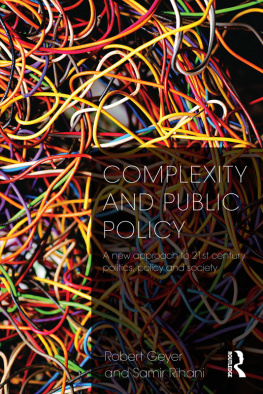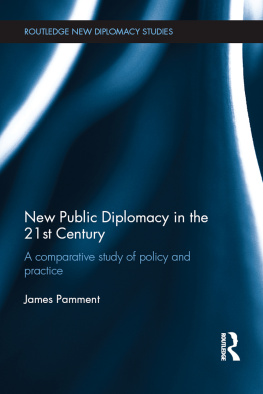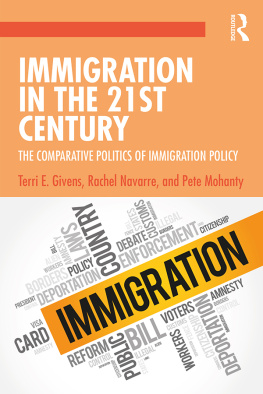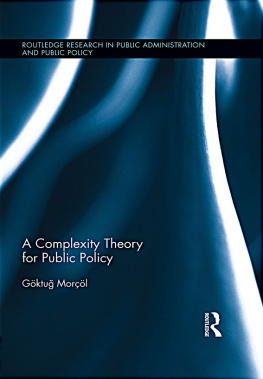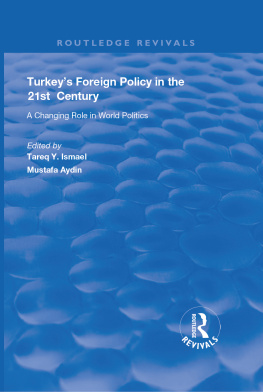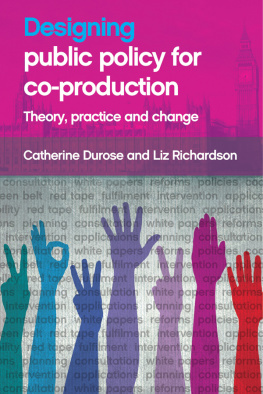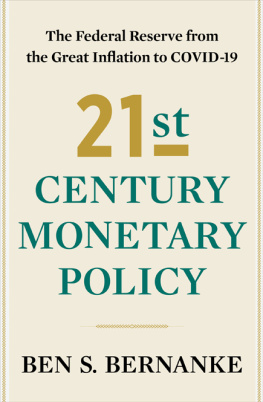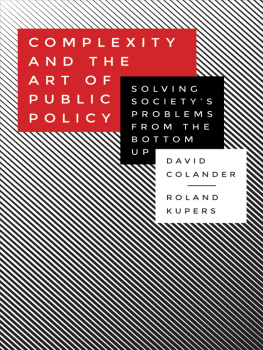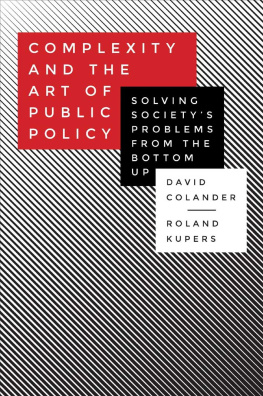Complexity and Public Policy
Complexity and Public Policy: A New Approach to 21st Century Politics, Policy and Society challenges the predominantly orderly paradigm, concepts and tools of public policy with a new framework based on a complexity perspective, concepts and tools.
This book provides a clear, concise and readable introduction to complexity thinking, its application to the social sciences and public policy, and the relevance of some of its various tools to those fields of politics, health, the international realm, development, planning and terrorism. The authors argue that the foundation for many of the current crises in these areas can be traced to the attempt by social scientists and policy-makers to treat these systems and processes as fundamentally orderly, predictable and controllable. Adopting a complexity framework and using some its tools is a first step in moving towards a more realistic and humane politics, policy and society in the 21st century. The book is vital reading for students and scholars of the social sciences and public policy, and also policymakers and the policy actor audience.
Robert Geyer is Professor of Politics, Complexity and Policy at the Department of Politics and International Relations at Lancaster University, UK.
Dr Samir Rihani is Research Fellow at the University of Liverpool, UK and is Non-Executive Director of the Liverpool Primary Care Trust, UK.
Complexity and Public Policy
A new approach to twenty-first century politics, policy and society
Robert Geyer and Samir Rihani
First published 2010
by Routledge
2 Park Square Milton Park Abingdon Oxon OX14 4RN
Simultaneously published in the USA and Canada
by Routledge
270 Madison Avenue, New York, NY 10016
Routledge is an imprint of the Taylor & Francis Group,
an informa business
2010 Robert Geyer and Samir Rihani
All rights reserved. No part of this book may be reprinted or reproduced or utilised in any form or by any electronic, mechanical, or other means, now known or hereafter invented, including photocopying and recording, or in any information storage or retrieval system, without permission in writing from the publishers.
British Library Cataloguing in Publication Data
A catalogue record for this book is available from the British Library
Library of Congress Cataloging-in-Publication Data
Geyer, Robert.
Complexity and public policy: a new approach to 21st century politics,
policy, and society/Robert Geyer and Samir Rihani.
p. cm.
Includes bibliographical references.
1. Policy sciences. 2. Political planning. 3. System theory. 4. Complexity(Philosophy) 5. European Union countriesSocial policyPlanning. 6. TerrorismPrevention. I. Rihani, Samir, 1938- II. Title.
H97.G49 2010
320.6dc22 2009034892
ISBN 10: 0-415-55662-7 (hbk)
ISBN 10: 0-415-55663-5 (pbk)
ISBN 10: 0-203-85692-9 (ebk)
ISBN 13: 978-0-415-55662-0 (hbk)
ISBN 13: 978-0-415-55663-7 (pbk)
ISBN 13: 978-0-203-85692-5 (ebk)
Contents
Figures
Tables
Preface
Who are we and why did we Write this Book?
This book emerged out of two related frustrations in the 1980s: Robert Geyers inability to find true socialism and Samir Rihanis despair at the plight of poorer nations to get off the bottom of the ladder in a harsh and baffling world.
For Robert, an idealistic young American who was disgusted with the limitations and right-wing orientation of American politics during the Reagan presidency, Europe offered multi-party democracy, real socialist parties and a chance to check out the edge of the Soviet bloc. After studying in Paris and England, he returned to the US and began his PhD at the University of Wisconsin determined to solve the crisis of democratic socialism. However, as the PhD progressed he became less and less convinced of the intellectual hegemony of socialism. It still held his heart and hopes, but couldnt explain the amazing transformations at the end of the twentieth century. Moreover, as his interests took him deeper and deeper into the mire of European Union politics, it became increasingly clear that no theory could possibly deal with its evolving multi-level dynamics in a traditional scientific fashion. In essence, he had finally realised the remarkable complexity of social and economic life and began to ask, What next?!.
Samir grew up as a Christian in Baghdad and left to study for a civil engineering degree at the University of Liverpool. After obtaining his degree, he married and settled in Liverpool working, among other places, in the planning and transport departments of Liverpools local government. Samir was part of Liverpools largest planning exercise when Liverpool and its sub-region tried to plan its way out of its economic and demographic difficulties in the 1970s. The ink was barely dry on the plan when it became obvious to Samir that this massive exercise was a complete waste of time and effort, a desperate attempt to put a gloss of order on a fundamentally chaotic situation. He also reached a broader conclusion: if they cant get it right in Britain what chance is there for poorer counties to move ahead? Later, after working in tourism and international development Samir went back to the University of Liverpool to undertake research for a PhD in complexity and international development. Robert, a young academic at the time, was one of Samirs PhD supervisors.
In the beginning, Robert was very sceptical of Samirs thinking on complexity. Without a physical science background, Robert was afraid to make unsafe linkages to those non-social science fields. Moreover, as a young academic at the beginning of his career he was scared of going beyond the safety of his particular area of expertise. His own training and academic experiences had shown him that the best way to get along in academic circles was to pick a small research topic and focus on it exclusively. Over time he would become the expert on that area, a safe pair of hands.
But Samir would not let up. Week after week he would confront Robert with new complexity ideas and concepts. As the weeks turned into months, then years, Roberts reluctance and fear began to fade. The complexity literature in the physical and social sciences continued to build up and Robert began to apply it to his areas of expertise, European Union politics and policy, Scandinavia and public policy. It gave him a new way of thinking about old problems and a broader perspective that refused to allow him to go back into his safe box. And most wonderful of all, it made academic work fun again! The obvious next step was some sort of joint project, or book.
The first signs did not auger well. Samir was busy writing his book, Complex Systems Theory and Development Practice, lecturing at the School of Politics at the University of Liverpool, building up his website www.globalcomplexity.org and acting as a non-executive director on various National Health Service Boards in Liverpool. Robert was also busy with normal academic demands, publishing several books, creating a complexity network at Liverpool and running a major Complexity, Science and Society conference in 2005. In 2006 he moved to Lancaster University. Nevertheless, the book was always in the back of their minds. They just needed to get enough time to bring the multiple strands together. What it finally took was one swift kick up the backside by the best student they had ever taught, Abbie Badcock. The result is before you.


